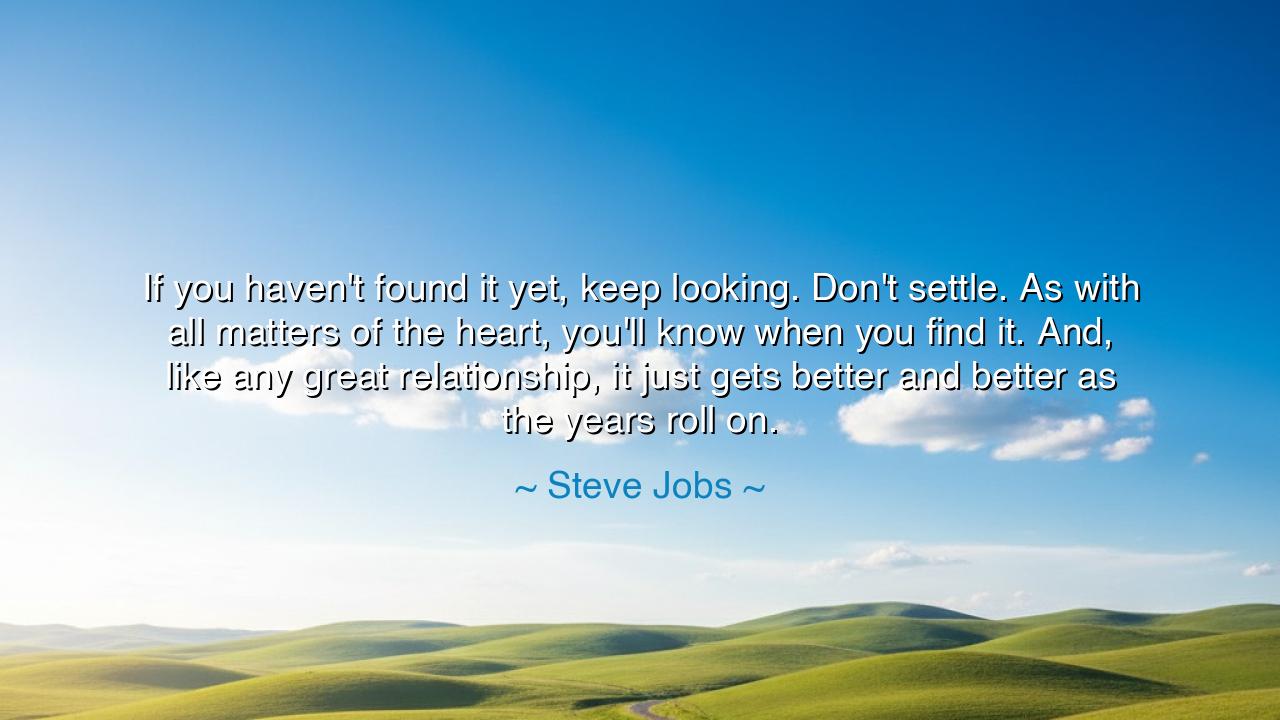
If you haven't found it yet, keep looking. Don't settle. As with
If you haven't found it yet, keep looking. Don't settle. As with all matters of the heart, you'll know when you find it. And, like any great relationship, it just gets better and better as the years roll on.






“If you haven't found it yet, keep looking. Don't settle. As with all matters of the heart, you'll know when you find it. And, like any great relationship, it just gets better and better as the years roll on.” — Steve Jobs
In these timeless words, Steve Jobs, the visionary who reshaped the world through imagination and will, speaks not merely of work or career, but of the great quest that defines every human life: the search for purpose. His counsel to “keep looking” is both a command and a comfort, for it reminds us that life’s truest fulfillment cannot be rushed, nor can it be found in half-measures. To “not settle” is to refuse the easy path of complacency—to continue seeking the calling that awakens both heart and mind, the work or love that feels not like duty, but like destiny. Jobs understood that this search, though long and uncertain, is the sacred journey through which the soul discovers its reason for being.
The origin of this quote lies in his 2005 Stanford University Commencement Address, one of the most celebrated speeches of the modern age. There, Jobs stood not as a titan of technology, but as a man who had known success, failure, exile, and return. He spoke of being fired from Apple—the company he had created—as both a humiliation and a liberation. In losing everything, he rediscovered his passion, founding NeXT and Pixar, and through those ventures, ultimately found his way back to Apple stronger and wiser. His words were born not of comfort, but of hardship; not of theory, but of experience. “Keep looking,” he told the young graduates, for he himself had wandered through darkness until he found light again.
When he spoke of “matters of the heart,” Jobs reached beyond the language of commerce into the realm of the eternal. He knew that the heart, not the intellect, is the true compass of greatness. Logic may guide us to safety, but only passion leads us to meaning. The ancients, too, understood this truth. The philosopher Socrates taught that wisdom begins with knowing oneself, and that to follow the soul’s calling is to live virtuously. The poet Rumi wrote, “Let yourself be silently drawn by the strange pull of what you really love; it will not lead you astray.” Jobs’s wisdom stands in this same lineage—he urges us to trust that when we find the work, the path, or the love that is meant for us, we will know it as the heart knows home.
Consider the life of Thomas Edison, who labored through countless failures in pursuit of light. Each defeat was not a dead end, but a direction. He refused to settle for mediocrity or for the comfort of “good enough.” He kept looking—testing, tinkering, believing—until his creation illuminated the world. Jobs’s own path mirrored this relentless faith in discovery. He believed that passion and persistence could carve beauty from chaos, that what begins as uncertainty can end in wonder. And just as Edison’s invention transformed night into day, Jobs’s vision of elegant technology turned machines into companions of human creativity.
The phrase “don’t settle” carries a heroic defiance, a reminder that comfort is the enemy of greatness. Many stop searching because fear whispers that what they have is enough, that to reach for more is folly. But Jobs teaches that settling for less than what stirs your soul is a kind of quiet death. The heart grows restless when confined, and the spirit withers when it ceases to seek. To keep looking is not an act of impatience—it is an act of faith: faith that life holds something more, that destiny waits for those who dare to pursue it.
And yet, when he says that “like any great relationship, it just gets better and better as the years roll on,” Jobs gives us a vision of fulfillment that is not fleeting but enduring. True purpose, once found, deepens with time. Like love, it matures through devotion, trial, and joy. The early passion becomes steadier, more luminous. This is the heart’s reward for perseverance—not a single moment of triumph, but a lifetime of meaning. The artist who paints for decades, the teacher who watches generations learn, the craftsman who perfects his art—all find that their work, like love, becomes richer the longer it is lived.
The lesson, then, is clear and eternal: never stop searching for what gives your life fire. Do not mistake comfort for peace, or routine for fulfillment. Seek the work, the love, the purpose that makes you lose track of time—that awakens something noble and tender within you. When you find it, you will know, for your heart will answer with certainty. And once you do, devote yourself to it completely, for greatness is not found in beginnings alone but in the faithful deepening of what we love.
So, O seeker of purpose, take heed of Steve Jobs’s wisdom. Keep looking, and never settle. The world will tempt you with safety, with shortcuts, with the ease of “enough.” Resist them. Be patient in your searching and courageous in your choosing. For one day, when you find that which calls to your soul, it will transform not only your life but the lives of others—and with each passing year, like a great love, it will only grow more radiant.






AAdministratorAdministrator
Welcome, honored guests. Please leave a comment, we will respond soon